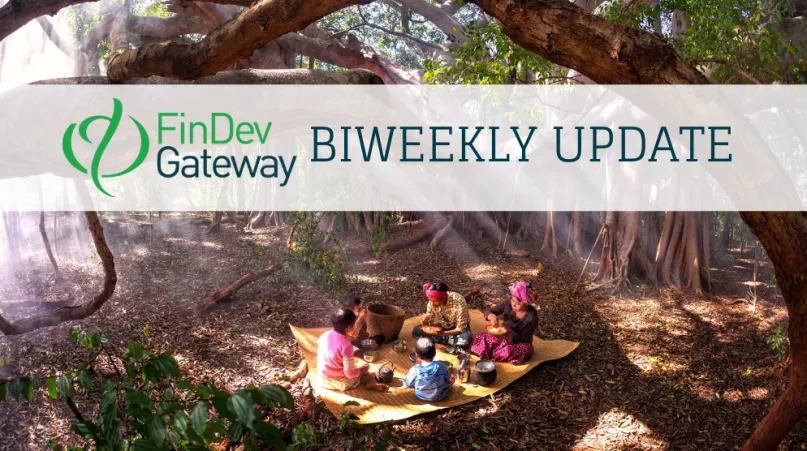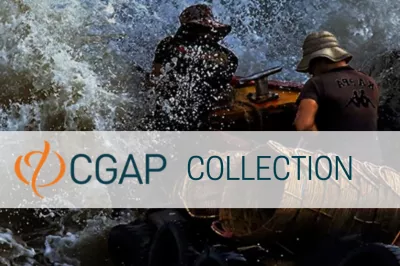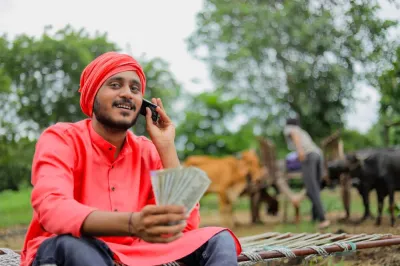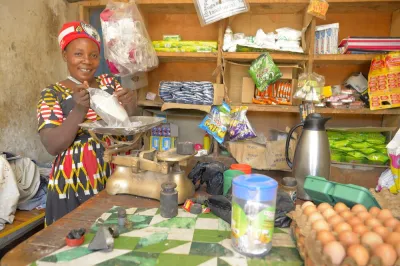FinDev COVID-19 Update | 03 - 16 Dec 2020

FinDev Gateway has created this COVID-19 Update with the latest and most relevant knowledge resources for financial inclusion. Sign up to receive this update to your inbox.
If you have content to share in our COVID-19 update, please submit here or contact us directly.
Do you find the FinDev Update useful? Take a moment to let us know >>
Global Update
- According to a brief by the Center for Financial Inclusion, universal access to basic accounts that can be opened under simplified due diligence (SDD), and at no initial cost to the customer, may be more cost-effective for governments than trying to onboard people during a crisis. The brief offers additional lessons from various countries that sought to enable rapid payments for those without existing accounts.
- The International Finance Corporation and UN Women surveyed over 80 companies and organizations from around the world documenting emerging practices and initiatives for supporting women employees and entrepreneurs during the pandemic. Many companies took important measures to create a more equitable and flexible working environment for women by supporting women’s access to and use of digital technologies, offering financial and non-financial services, adopting family-friendly policies and supporting women’s well-being and mental health, including addressing and preventing gender-based violence.
Asia
- In the Philippines, the percentage of households that were able to save rose slightly in October compared to July levels, according to a Philippine Central Bank survey. However, this increase is concentrated in the higher and middle income groups, while low-income households’ savings declined slightly.
- Small businesses in Mongolia were hit much harder than large businesses by the economic impact of COVID-19, according to a new Asian Development Bank (ADB) report. The report provides recommendations for sustainable recovery going forward, stating that the initial government response should have included more actions to enable access to finance.
- ADB has approved a $500 million loan to support Indonesia’s recovery from COVID-19 through the expansion of financial inclusion among micro, small, and medium-sized enterprises and marginalized groups such as women and youth.
- Remittances to Pakistan have continued to rise in spite of the pandemic, reaching over $2 billion per month since July. The State Bank of Pakistan believes that government initiatives to formalize remittances, increasing use of digital channels and some improvement in the global economy have contributed to this increase.
Africa
- In Ghana, the value of mobile money transactions doubled from January to October 2020 compared to the same period in 2019, due in part to the COVID-19 pandemic, according to the Governor of the Bank of Ghana.
- Kenyans have increased the usage of digital payments since the pandemic; a study of low and moderate income households reveals that 38 percent of respondents are using digital payments more than they did before the pandemic and 24 percent have learned how to make digital payments for the first time.
- The Kenyan government has announced the termination of some of the tax relief measures for households and businesses during the pandemic as the country’s debt level approaches the $90 billion ceiling.
- Data from the World Bank high frequency surveys in Ethiopia shows the disproportionate impact COVID-19 is having on women. 64 percent of laid-off workers in April were women, and 44 percent of women-headed households reported to have lost some or all income compared to 25 percent of male-headed households.
- Xoom, Paypal’s remittance provider, has announced a new service that enables mobile money transfer from the UK, Europe and North America to mobile wallets in 12 African countries. The company aims to help bring down the cost of remittances to Sub-Saharan Africa, which are expected to decline by 9 percent in 2020 due to the pandemic.
For more on Africa, check out the latest Portail FinDev Biweekly Update in French.
Latin America and the Caribbean
Most articles and knowledge resources referenced in this section are in Spanish.
- In Bolivia, banks and MFIs opposed a decree with new provisions for loan moratoria, which includes the transfer of deferred payments to the end of the loan payment plan, without applying additional interest or penalties, and allowing the deferred payments to be paid in fixed installments as opposed to a lump sum.
- According to a study by Innovations for Poverty Action, 90 percent of low-income households who benefited from a cash transfer program in Colombia used the money to buy food. Beneficiaries were less likely to sell their belongings to cover expenses and more likely to invest in their children’s education. Regardless of how the transfer was made (cash or digital), beneficiaries still had to leave their home during the quarantine to collect payment either because they needed to cash out the funds or because they lacked understanding on how to get them.
- In Mexico, SMEs’ lack of access to credit is likely to slow down the country’s economic recovery from COVID-19. SMEs generate 95 percent of the private sector employment in the country, but only 13 percent of them have access to formal credit.
- In Argentina, 4.8 million new bank accounts were opened during the pandemic, meaning that 80 percent of the adult population now has a bank account, and the number of ATMs and banking agents also grew by 40 percent.
- In Peru, a new attempt to speed up the approval of a new bill that seeks to put caps on interest rates in the financial sector was opposed by banks and MFIs. They argue that the measure will make it difficult for financial providers to continue providing small loans, therefore, pushing the unbanked and low-income clients to seek informal credit.
For more on LAC, check out the latest Portal FinDev Biweekly Update in Spanish.
Arab World
Some articles and knowledge resources referenced in this section are in French.
- With the COVID-19 pandemic increasing customers’ preference for digital payments, Amazon has launched its own service in the MENA region. In 2017, Amazon acquired PAYFORT, one of the earliest fintechs in the region, and this month it was launched as Amazon Payment Services.
- Emerging fintechs are benefiting from the surge in e-commerce activity due to the pandemic, with payment platforms dominating the regional fintech scene. While the Middle East still only represents one percent of global fintech investment, the sector is growing at 30 percent a year. Many fintechs are looking to boost financial inclusion by bringing basic financial services to low-income workers, such as remittances for migrant laborers in the Gulf states.
- Previously dominated by cash, the Middle East is set for major growth in e-commerce and digital payment industries in 2021. A new Mastercard study on consumer sentiment and spending showed a rapid growth in online shopping in Saudi Arabia, with 77 percent of consumers spending more money online since the beginning of the pandemic.
- Egyptian workers' remittances increased by $1.3 billion, reaching a total of $8 billion in the July-September 2020 quarter, according to the Central Bank of Egypt.
For more on the Arab world and resources in Arabic, check out the latest FinDev Update in Arabic.
COVID-19 Resources

COVID-19 Resource Hub
A collective space for the financial inclusion community to share experiences and lessons learned from the pandemic
FinDev Coronavirus Data Tracker
Data relevant for financial inclusion - find out who is tracking what

Blogs & Opinion
If you have a blog idea and would like to write for the FinDev Blog, please review our guidelines. We do not cross-post blogs that have been published elsewhere, but if you wish to share an existing blog post in our next FinDev COVID-19 Update, you can send it to us using our contact form.
Investment
Questions for EIB Group: DFIs, Financial Inclusion and the COVID-19 Response
03 Dec 2020 | Cristina Dumitrescu & Olivier Edelman | CFI-Accion
Digital and Fintech
The Calling to Serve: A Prime Driver for Digital Transformation in Microfinance Institutions, With or Without a Pandemic
11 Dec 2020 | Zunilda Vergara Monsalve | Boulder Institute of Microfinance
Inclusive Fintech Lending–Lessons From US and China
04 Dec 2020 | David Porteous & Arend Kulenkampff | BFA Global
Socioeconomic Impact
A Lifeline at Risk: COVID-19, Remittances and Children
10 Dec 2020 | Saskia Blume & Nour Moussa | World Bank
How COVID-19 Affects Households in Poorest Countries – Insights From Phone Surveys
10 Dec 2020 | Nobuo Yoshida, Ambar Narayan & Haoyu Wu | World Bank
Mapping the Impact of COVID-19 on Firms in LMICs: A Snapshot From Ongoing Surveys
04 Dec 2020 | Gaëlle Conille & Siena Harlin | J-PAL
Tracking Colombians’ Experiences with COVID-19: Households Face Mounting Challenges as Virus Endures
03 Dec 2020 | Sebastian Chaskel, Kyle Holloway & Luciana Debenedetti | Innovations for Poverty Action (IPA)
Recent Publications
Do you have a publication to add to this list? Share your work on FinDev Gateway.
Socioeconomic Impact
Impact of COVID-19 on Banking Agents in Bangladesh
MicroSave Consulting (MSC) | Dec 2020
Responding to COVID-19 in Indonesia
MicroSave Consulting (MSC) | Dec 2020
Coping With COVID-19 in Kenya
MicroSave Consulting (MSC) | Dec 2020
Responding to COVID-19 in Kenya
MicroSave Consulting (MSC) | Dec 2020
Savings and Retail Banking in Africa
World Savings and Retail Banking Institute (WSBI), Mastercard Foundation | Nov 2020
Response and Recovery
Bridging the Gap: Emerging Private Sector Response and Recovery Measures for Gender Equality Amid COVID-19
International Finance Corporation (IFC), UN Women, European Union | Dec 2020
Sustainable Recovery Options for Mongolia’s Micro, Small, and Medium-Sized Enterprises
Asian Development Bank (ADB) | Dec 2020
Remote Data Collection During the Time of COVID-19: Lessons from Rwanda
The SEEP Network, Association of Microfinance Institutions in Rwanda (AMIR), Mastercard Foundation | Dec 2020
Digital Finance
State of the Digital Financial Services Market in Zambia 2019
United Nations Capital Development Fund (UNCDF) | Dec 2020
Social Protection
Designing Municipal Cash Transfer Programs to Mitigate the Economic Impact of COVID-19
Center for Financial Inclusion at Accion | Dec 2020
Protecting Beneficiary Data: Guidance for Municipal Cash Transfer Programs Responding to COVID-19
Center for Financial Inclusion at Accion | Dec 2020
Rapid Response for Social Payments During COVID-19
Center for Financial Inclusion at Accion | Dec 2020
View All Publications Related to COVID-19 >
Webinar Recordings
Microfinance and the Poor in Times of Crisis
30 Nov | CGAP
What Is the Future of Microfinance?
20 Oct | FinDev Gateway
View All Upcoming Events Related to COVID-19 >
News
New Mastercard Study Reveals Rapid Shift Toward Digital Payments in Saudi Arabia
| Arab News | Saudi Arabia
$500 Million ADB Loan to Expand Financial Inclusion in Indonesia
| Asian Development Bank (ADB) | Indonesia
View All News Related to COVID-19 >
Quick Links:
FinDev Guide
About this guide
Published
Topics
Contributed by a global financial inclusion community member. Share your lessons learned
Write for usLeave a Comment
Comments on this page are moderated by FinDev Editors. We welcome comments that offer remarks and insights that are relevant to the post. Learn More


